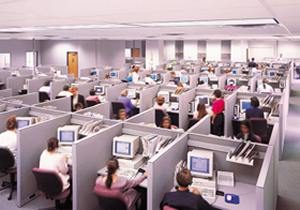
A Manipulative Aspect of Office Space
French philosopher Louis Althusser hypothesizes that “ideology represents the imaginary relationship of individuals to their real conditions of existence.” What on earth could be meant by this assemblage of words? One tends to think of ideology at the individual level. That is, a person’s ideology is the set of chosen beliefs that represent his/her worldview. Following Althusser’s logic, ideology is not unique to the individual, but rather an institution that drives the very ideas people think they are forming themselves into individuals. Also implied by Althusser’s language is that these ideas give people a distorted sense of reality. A casual viewer wouldn’t see a trace of ideology in Office Space, the 1999 cult classic comedy. But according Althusser, culture is inherently permeated by ideology. With this in mind, the misrepresentation of reality in this film becomes evident. The reason people love Office Space is that it gives them a false feeling of empowerment, making them feel better about their lives.
Office Space tells the story of Peter Gibbons, an IT worker disgruntled by his hopelessly boring and unrewarding job. For eight hours a day, he sits in a cubicle, updating trivial software while being pestered by his eight bosses about the headers on his TPS reports. Then one night, his unfaithful girlfriend takes him to a psychic with the half-hearted hope of getting him out of his perpetual state of unhappiness. The psychic puts him into a state of total relaxation and clear-mindedness, which is supposed to last until he snaps his fingers. But suddenly, the psychic gets a heart attack and dies, leaving Peter in zen mode. The next day, he sleeps in until noon, ignoring the repeated calls of his girlfriend and boss. Previously to afraid to approach the waitress he is enamored with, Peter casually asks her out to lunch and begins a happy relationship with her. When he finally does show up for work a few days later, an hour and a half late and wearing jeans and a t-shirt, he is no longer driven down by his bosses, but instead simply ignores them, casually playing Tetris on his computer all day. And somehow, the consultants who had been summoned to fire unproductive workers decide promote him, feeling he was not being properly motivated. He runs into a bit of trouble when his plan to move millions of fractions of pennies from his company’s account to his own goes awry, but in a miraculous turn of events, Peter is cleared of any wrongdoing. At the end of the movie, he is working happily in construction with the waitress girl by his side.
Office Space does not exist in the way that water and sunlight do; it was created by members of society. In turn, it must serve some purpose, or it would not have been created in the first place. In trying to define this purpose, it is tempting to turn for an easy answer like entertainment, a break from the constant pressure society puts on us to be productive, or simply to make its creators money. Yet such an answer only digs so deep into what people get out of the movie; it leaves open the questions of why it entertains us, why it provides a break and in turn, why it makes money. To find the true purpose of Office Space is to find why people like it.
First, let’s look at which people like it. Office Space’s main audience, the cult following it has accrued, consists of people with jobs and lives that remind them in some ways of Peter’s, boring, cubicle job and life. These people can relate to Peter’s initial societal-driven depression, but what they truly love about Peter is precisely what separates them from him: how he overcomes his depression. No low-level, white-collar worker has ever knocked over his cubicle and then told his boss “Oh yeah, I’ll have to get on that” when he points it out, lying on the ground. That’s what these “cubicle workers”–the people who feel trapped by society–admire about the film. Peter doesn’t give a fuck, and because of that, his life is way better than when he did. He’s got a smoking hot girlfriend who’s into Kung fu and despite the fact that he only shows up to work half the time, he gets a promotion. Instead of every day being the new worst day of his life, his life keeps getting better and better. This is the ideology the film contains: when one stops caring about the rules of the system, he frees himself of the constraints of the system, opening the door to a euphoric life.

What’s manipulative about the way this ideology is presented is that the “cubicle working” audience comes away from the film feeling empowered. Viewers are left with the sense that they, through Peter’s actions, had stood up against the system that is bringing dreariness to their lives. In reality, of course, the viewers have done nothing of the sort and will go right back to their desk jobs, needy families and massive debts. Yet, with their vigilante Peter in mind, they feel a little better about it, as though they could at any point decide to disregard all their obligations the way he does. In this way, Office Space shapes the “imaginary relationship of individuals to their real conditions of existence.” In other words, the movie affects how people imagine their lives are, despite the fact that it does nothing to change their lives. Proof of this occurrence can be found by looking at Office Space’s biggest fans, those who are truly part of the cult. These people all champion Peter’s rejection of his societal responsibilities. They may consider societal rejection as one of the ideas most important to them, as helping to define them. But even these, true fans are unwilling to take this idea from imagination to reality; that is, not showing up to work.

The reason why people don’t follow in Peter’s footsteps is that as attractive as his solution is made to seem, it is not legitimate. For Peter, ignoring his responsibilities leads to a better girlfriend, a better job, less stress and in turn, more happiness. But for real “cubicle workers,” doing this would lead to being fired, divorced, losing custody of their children, and, with unpaid bills piling up, eventually being thrown in prison. As such, Peter’s solution is not an option for “cubicle workers.” This means that not only is the feeling of empowerment that people get from Office Space imaginary, but so is the means by which people get the feeling. Not only does Office Space trick people into feeling better about their lives, but it provides no useful information as to how they can actually improve them. As Althusser would put it, Peter’s actions are an imaginary solution to a real world conflict.
The same logic can be used to explain why so many rich white kids listen to trap music. In no way can these privileged youths possibly connect with the themes of gun violence and drug trafficking that exist in many trap songs, yet these themes are undeniably one trap’s of the biggest draws. Thus, the reason they admire trap is not that they can relate to it, but that they want to relate to it. The trap life is so foreign, so glamorized, so cool, and trap music appears to bring them one step closer on the mile-long trip to it. Still, no rich white kid would ever consider moving to the hoods of Atlanta, cooking up some dope and starting life anew as a drug dealer. As such, the satisfaction trap music provides these kids with is that it helps form their imaginary relationship to the trap life.

<> on October 3, 2009 in Boca Raton, Florida.
The bitter irony of the manipulative side to Office Space is that its makers are providing a crucial service to the very system they are denouncing. The happy and satisfying imaginary world that Office Space creates for its viewers through Peter’s actions distracts them from their constricted realities. If people can go to work feeling as if they have some control over their jobs, as if they have the choice to quit at any moment, then society has an even stronger grip on them. These artificially content people are the least likely to actually quit. Only a person who is truly disgusted by the lack of control they have over their own lives is willing to reject the system of social obligation.
One must remember that intent has nothing to do with this. The makers of Office Space weren’t necessarily trying to attract viewers by manipulating them into thinking their lives are better. More likely, they tried to make a movie that is funny, clever, introspective and that speaks to what they believe in. What matters, however, is that in expressing what’s funny, clever and introspective to them, in expressing what they believe in, as a matter of course they expressed ideology. And, as demonstrated, in expressing ideology, they manipulate their viewers. The ideology that they can free themselves from their responsibilities misleads viewers into thinking they, not the system, have overwhelming control over their lives. With this imaginary relationship to reality, the “cubicle workers” of our society remain just that.